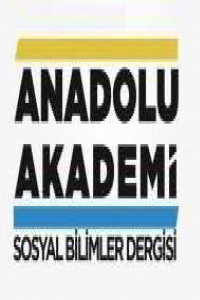Abstract
Türkçede fiilimsiler, kendinden önce ya da sonra gelen sözcük ve ek/edatlarla ilişkisi bakımından önemli bir yere sahiptir. Bu çalışmada, birleşik cümle yapısına dâhil edilen fiilimsilerin yargı belirtip belirtmediği üzerine durulmuştur. Bu durum, Türk grameri sorunları bildirisinde de tartışılan ve kesin bir sonuca bağlanmayan hususlardan biridir. Çalışmada, fiilimsilerin birleşik cümle yapısında değerlendirilmesi gerektiği belirtilmiş ve bu durumun fiilimsilerden kaynaklı olmadığını eklendiği fiilin derin yapıda cümleyi meydana getirecek olan hem kip-zaman hem de şahıs ekinin mevcut olmasından kaynaklandığı üzerinde durulmuştur. Burada söz konusu olan çelişkinin sadece yüzey yapıda inceleme yapılmasından kaynaklı olduğu belirtilmiş, bu çelişkinin ortadan kalkması için derin yapıda da incelenme yapılması önerilmiştir. Fiilimsilerin sadece yan cümleyi ana cümleye özne ve tümleç göreviyle bağlayan birer vasıta olduğu belirtilmiştir. Sonuç kısmında, bu durum, derin-yüzey yapı ilişkilerinin gösteriminde kullanılan çözümleme yöntemiyle belirtilmiştir.
References
- Banguoğlu, T. (2015). Türkçenin Grameri. Ankara: TDK Yayınları.
- Buğra, T. (2017). Firavun İmanı. İstanbul: İletişim Yayınları.
- Daşdemir, M. (2014). Oklama Yöntemiyle Türkçenin Yapısal-İşlevsel Söz Dizimi. Erzurum: Eser Basım Yayınları.
- Eker, S. (2017). Çağdaş Türk Dili. Ankara: Grafiker Yayınları.
- Ergin, M. (2019). Türk Dil Bilgisi. İstanbul: Boğaziçi Yayınları.
- Karaağaç, G. (2013). Dil Bilimi Terimleri Sözlüğü. Ankara: TDK Yayınları.
- Karahan, L. (2017). Türk Dili Üzerine İncelemeler. Ankara: Akçağ Yayınları.
- Korkmaz, Z. (1992). Gramer Terimler Sözlüğü. Ankara: TDK Yayınları.
- Özkan, M & Sevinçli, V. (2017). Türkiye Türkçesi Söz Dizimi. İstanbul: Akademik Kitaplar Yayınları.
- Rauf, M. (2014). Eylül. Ankara: Akçağ Yayınları.
- Uşaklıgil, H. Z. (2016). Mai ve Siyah. İstanbul: Özgür Yayınları.
- (http://www.tdk.gov.tr) (Erişim tarihi: 18.06.2021 14.04).
Abstract
In Turkish, verbals have an important place in terms of their relationship with words and affixes/prepositions that come before and after them. This study focuses on whether the verbals included in the compound sentence indicate a judgment. This situation is one of the issues discussed in the Turkish grammar problems statement and not tied to a conclusion. The study suggests that verbals should be evaluated in the compound sentence structure, based on the reasoning that this is not due to verbals, but rather the verb, which the verbal is added to, already has the tense and personal suffixes which would form the sentence through the deeper structure. The study states that the contradiction in question is due to examining the surface structure only, and suggests to examine the deep structure in order to eliminate this contradiction. It has been stated that verbals are only a means of connecting the subordinate clause to the main sentence with the subject and complement function. In the conclusion part, this situation is indicated by the analysis method used in the representation of deep-surface structure relations.
References
- Banguoğlu, T. (2015). Türkçenin Grameri. Ankara: TDK Yayınları.
- Buğra, T. (2017). Firavun İmanı. İstanbul: İletişim Yayınları.
- Daşdemir, M. (2014). Oklama Yöntemiyle Türkçenin Yapısal-İşlevsel Söz Dizimi. Erzurum: Eser Basım Yayınları.
- Eker, S. (2017). Çağdaş Türk Dili. Ankara: Grafiker Yayınları.
- Ergin, M. (2019). Türk Dil Bilgisi. İstanbul: Boğaziçi Yayınları.
- Karaağaç, G. (2013). Dil Bilimi Terimleri Sözlüğü. Ankara: TDK Yayınları.
- Karahan, L. (2017). Türk Dili Üzerine İncelemeler. Ankara: Akçağ Yayınları.
- Korkmaz, Z. (1992). Gramer Terimler Sözlüğü. Ankara: TDK Yayınları.
- Özkan, M & Sevinçli, V. (2017). Türkiye Türkçesi Söz Dizimi. İstanbul: Akademik Kitaplar Yayınları.
- Rauf, M. (2014). Eylül. Ankara: Akçağ Yayınları.
- Uşaklıgil, H. Z. (2016). Mai ve Siyah. İstanbul: Özgür Yayınları.
- (http://www.tdk.gov.tr) (Erişim tarihi: 18.06.2021 14.04).
Details
| Primary Language | Turkish |
|---|---|
| Journal Section | Articles |
| Authors | |
| Publication Date | March 22, 2022 |
| Published in Issue | Year 2022 Volume: 4 Issue: 1 |
Anatolian Academy Social Sciences Journal ISSN: 2667-5471


